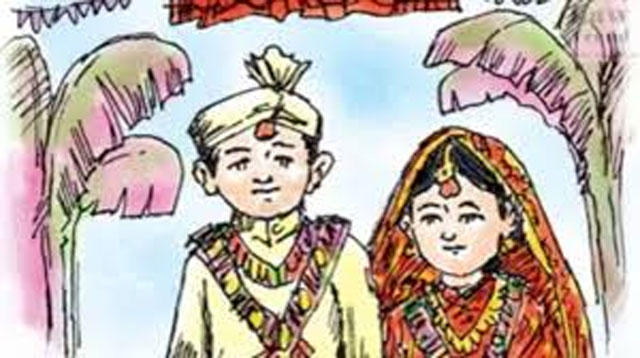Daijiworld Media Network – Bengaluru
Bengaluru, Oct 7: Karnataka has recorded one of the most significant declines in child marriage cases in the country, with a reduction of 55% among girls and 88% among boys over the past three years, according to a new national study. The report credits a combination of grassroots awareness, legal reform, and community-led reporting mechanisms for the achievement.
The study, titled “Tipping Point to Zero: Evidence Towards a Child Marriage-Free India,” was published by Just Rights for Children (JRC), a coalition of over 250 NGOs. It attributes Karnataka’s success to proactive legal action, increased reliance on child-friendly support systems, and persistent awareness campaigns that have strengthened public trust.

Nationally, child marriages declined by 69% among girls and 72% among boys. Assam registered the steepest drop among girls with an 84% fall, followed by Maharashtra and Bihar at 70% each, and Rajasthan at 66%.
The study, covering 757 villages across five states, was compiled by the Centre for Legal Action and Behaviour Change for Children (C-LAB), part of JRC’s India Child Protection initiative.
In Karnataka, most cases were reported through child helplines and welfare bodies rather than police. While 75% of respondents said they used child helplines, 53% approached Child Welfare Committees, and only 40% reported to police stations. The study highlights this trend as a reflection of increased confidence in community-based systems.
A landmark reform came when Karnataka empowered Panchayat Development Officers (PDOs) to register marriages. Their accessibility enabled early intervention and awareness, helping to prevent nearly 2,000 child marriages in 2021 alone. The study describes this localised governance model as a turning point in the fight against child marriage.
Karnataka also became the first state in India to amend the Prohibition of Child Marriage Act by making engagements involving minors a punishable offence. This legal innovation significantly expanded the scope of enforcement and was praised in the study for closing critical loopholes in the law.
Public engagement has played a vital role in Karnataka’s progress. Awareness campaigns were named by 92% of respondents as the most effective tool to prevent child marriage, while 50% cited prosecutions through FIRs and arrests as strong deterrents. However, challenges persist. Around 79% of respondents said fear of social stigma continued to discourage families from reporting cases, and 62% pointed to lack of awareness as a major barrier, especially in rural regions.
The central government’s Bal Vivaha Mukt Bharat (Child Marriage-Free India) campaign has also had high visibility. Nearly 99% of respondents in the study said they were aware of the campaign, learning about it primarily through NGOs, schools, and Grama Panchayats. In Karnataka, every respondent surveyed had taken a formal pledge against child marriage, and 78% identified NGOs as key facilitators in driving both awareness and action.
Community involvement has clearly been essential. In addition to helplines and committees, NGOs and local schools were identified as central to both prevention and education efforts. This close collaboration between community institutions and state actors has allowed Karnataka to create a more responsive and inclusive protection framework.
Despite these strides, the gap between estimated cases and official reporting remains wide. While Census 2011 recorded over 4.8 lakh children married before the legal age in Karnataka, only 783 cases were officially reported between 2019 and 2022. The report warns that until stigma and silence are addressed, under-reporting will continue to obscure the true scale of the issue.
Ravi Kant, national convener of JRC, said, “By declaring even engagements in child marriage cases a punishable offence, the Karnataka government has fortified the child protection ecosystem. Such strict measures are vital to dismantle this centuries-old crime.”
To build on these gains, the report calls for stronger enforcement of existing laws, mandatory registration of all marriages, and increased public awareness of the Bal Vivaha Mukt Bharat portal. It also recommends declaring a National Day Against Child Marriage to galvanise collective support for the goal of a child marriage-free India by 2030.